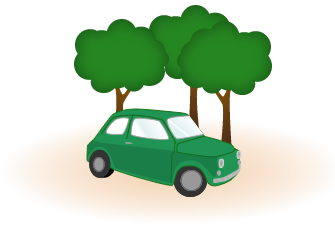The garage
Did you know ...... a 30.000 km year drive is the equivalent of 6.389 kg CO2 (calculated for a diesel monospace cas using up 8l/100 km)?
Lightweight plastics in cars save 9,2 million tons of CO2 and 2,32 million tons of fuel per year
Reduced weight + reduced rolling resistance = less CO2
Lowering rolling resistance for fuel savings and CO2 reduction
The escellent overall level of properties in highly dispersible silica-filled rubber mixture is a decisive factor in achieving improved road-holding and reduced tyre rolling resistance. This lowering of rolling resistance corresponds to a significant reduction in fuel consumprion and CO2 emissions of more than 5%! Rhodia's latest technology, the Zeosil® Premium range, pushes back these limits even further and provides an additional reduction of almost 10% in rolling resistance, whilst improving road-holding and tyre wear resistance.
Zeosil®, Rhodia
Did you know that 65% of drivers run with under inflated tyres across Europe?
Give those tyres some air
The correct tyre inflation pressure is essential for delivering performance and leads to better fuel economy and longer tyre life!.
As tyres naturally lose pressure over time, there are some measures to characterize this air loss over a month (% of air loss/month = IPR = Inflation Pressure Retention - the lower value, the better the air is kept). Currently, Butyl polymers provide better air barrier over time in the tyres (used in tyres innerliner) and are used widely.
What about if half of the EU passenger cars were transferred to higher butyl content in their tyres (with IPR = 2.5%)? 2.7 Million mT of CO2 could be saved per year!
New specialty elastomer compound , Exxpro® DVA can further improve the durability of tyres, make them lighter weight by using less raw material.
Exxon Mobil Chemical
Nanostructured materials for lighter vehicles
The nanostructuration technology developed by Arkema helps assemble polymers on a nanometric scale. It is applied to Altuglas® PMMA as a transparent and tough glass substitute in the manufacture of sunroofs, which helps reduce the weight of vehicles and hence save fuel.
Altuglas®, Arkema
High performance polymers from renewable sources
Entirely derived from a non-food vegetable material, Rilsan® polyamide 11 is used by many carmakers to manufacture fuel lines thanks to its outstanding properties, and help fulfill the most stringent standards in terms of permeability to hydrocarbons.
Rilsan® 11, Arkema
Easy rider
Tyres containing modern chemical solutions in their tread compund are, in fact, "easy rolling" tyres; they can cut fuel consumption by as much as 8%. Behind these fine results are silicas and new silicium-based molecules.
Their complex structure ensures a very effective combination within the rubber mixture. Only 100 grams of this so-called organosilane are required per typer.
Ultrasil®, Si 363®, Evonik Degussa
Replace metal by innovative plastics and save!
Innovative polyamide (nylon) engineering plastics have specifically been developed for metal replacement. These new polyamide grades are available for structural parts, under-the-hood, interior trim and body panle applications. Thanks to high mechanical properties combined with outstanding thermal and chemical resistancepolyamide allows 30% to 50% weight reduction for those automotive applications.
Technyl®, Rhodia
Chemistry makes you go green and light
Clean diesel filter technology
Brand new filter technology enables superior performanceand total lower system cost. This new material technology for diesel particle emission control meets the increasingly stringent global diesel engine emission regulations.
Dow Automotive
Honeycomb superfilters
A brand new type of diesel particulate filter features a chemically treated advanced ceramic honeycomb with a unique microstructure. It is a robust, lightweight, high-porosity filter that combines high filter performance with improved engine perfonmance.
Dow Automotive
Fuel efficient components: longer lasting and more atractive
Due to their light weight, polyolefin based materials are a growing choice for automotive components, including exterior parts featuring moulded-in-color. unlike conventional plastic stabilization systems, a new generation of stabilizers increases durability without interacting with coatings or interfering with paint adhesion.
Ciba® TINUVIN® XT 850

Advanced eelctricity on wheels
Electric and specially hybrid cars are getting more and more popular because of thei good ecological performance. Rapidly evolving battery technology is an obvious key to even more succes.
Lithium-ion batteris are in the forefront of this positive evolution. In the newest versions, battery separator film technology significantly enhaces the power, safety and reliability of lithium-ion batteries, thereby helping speed up the adoption of these smaller and lighter batteries into the next wave of lower-emission vehicles
Exxon Mobil Chemical
Engine durability
Components can be hot but not bothered, because metal, oil, housing and hoses are protected by Ciba antioxidants, antiwearing agents, corrosion inhibitors and heat stabilizers
Reduced weight
Plastics continue to replace other substances in bumpers, door panels and dashboards, making them lighter and more fuel efficient. Additives play a critical role in plastic manufacturing and long-term durability.
Aditivos Ciba
Waste to Fuel
Ther are many low cost alternatives to expensives refined vegetable oils. Crude vegetable oils, animal, fats, greases, soapstocks and recycled oils are useable feedstocks.
A new catalyst enables biodiesel porducers to make biodiesel from these inexpensive feedstocks. lowering their costs without sacrificing the purity of the end product. A simple and safer process, minimized waste and less energy consumption are the advantages
Amberlyst™ BD20, Rohm and Haas